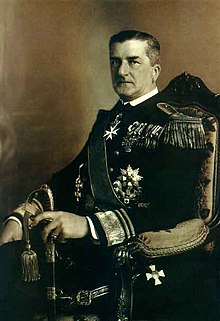Miklós Horthy
|
Vitéz Miklós Horthy de Nagybánya |
|
|---|---|

Official portrait of Miklós Horthy
|
|
| His Serene Highness the Regent of the Kingdom of Hungary |
|
|
In office 1 March 1920 – 15 October 1944 |
|
| Prime Minister |
See list
|
| Deputy | István Horthy (1942) |
| Preceded by | Károly Huszár (acting) |
| Succeeded by | Ferenc Szálasia |
| Personal details | |
| Born |
Miklós Horthy de Nagybánya 18 June 1868 Kenderes, Austria-Hungary |
| Died | 9 February 1957 (aged 88) Estoril, Portugal |
| Spouse(s) | Magdolna Purgly |
| Relations |
Father: István Horthy Mother: Paula Halassy |
| Children | |
| Religion | Calvinism |
| Military service | |
| Allegiance |
|
| Service/branch | Austro-Hungarian Navy |
| Rank | Commander-in-Chief Fleet |
| Battles/wars | First World War |
|
a. As "Leader of the Nation". |
|
|
Styles of Miklós Horthy |
|
|---|---|
 |
|
| Reference style | His Serene Highness |
| Spoken style | Your Serene Highness |
| Alternative style | Sir |
Miklós Horthy de Nagybánya (Hungarian: Vitéz nagybányai Horthy Miklós; Hungarian pronunciation: [ˈviteːz ˈnɒɟbaːɲɒi ˈhorti ˈmikloːʃ]; English: Nicholas Horthy;German: Nikolaus Horthy Ritter von Nagybánya; 18 June 1868 – 9 February 1957) was a Hungarian admiral and statesman, who served as Regent of the Kingdom of Hungary between World Wars I and II and throughout most of World War II, from 1 March 1920 to 15 October 1944. He was styled "His Serene Highness the Regent of the Kingdom of Hungary" (Hungarian: Ő Főméltósága a Magyar Királyság Kormányzója).
Horthy started his career as a Frigate Lieutenant in the Austro-Hungarian Navy in 1896 and attained the rank of admiral in 1918. He saw action in the Otranto Raid and the Battle of the Strait of Otranto and became Commander-in-Chief of the Austro-Hungarian Navy in the last year of the First World War. In 1919, following a series of revolutions and external interventions in Hungary from Romania, Czechoslovakia, and Yugoslavia, Horthy returned to Budapest with the National Army and established a regency government. Horthy led a national conservative government through the interwar period, banning the Hungarian Communist Party as well as the fascist Arrow Cross party, and pursuing an irredentist foreign policy in the face of the Treaty of Trianon. King Charles IV of Hungary unsuccessfully attempted twice to return to Hungary until, in 1921, the Hungarian Government caved in to Allied threats to renew hostilities. King Charles was escorted out of Hungary on a British warship into exile.
...
Wikipedia
